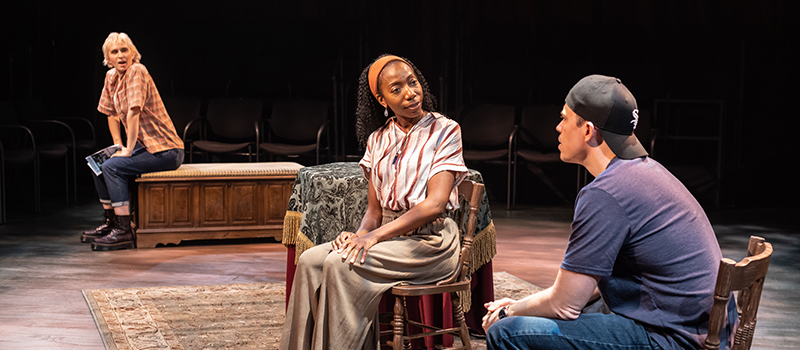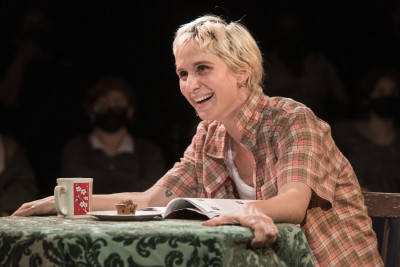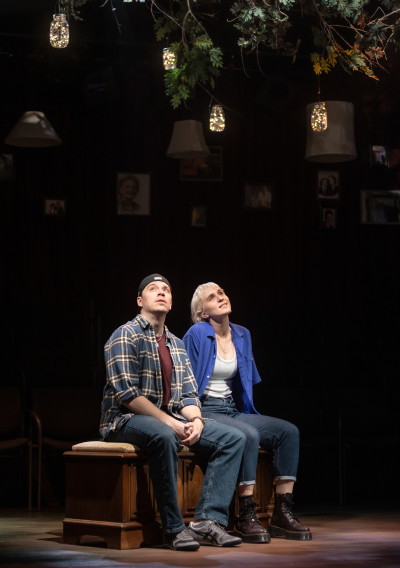by Rachael F. Goldberg | May. 6, 2022

There are a wide variety of beliefs about what happens to us after we die. Some believe in heaven or hell, some sort of reward or punishment for actions taken in this life. Some believe in reincarnation, a cyclical system in which people are reborn and start anew. Still others assert there is nothing, we simply cease to exist. And some, often known as spiritualists, believe people move to another plane of existence, just out of reach from this one – upstairs, if you will.
The citizens of and visitors to Lily Dale, a Spiritualist town in upstate New York, subscribe to this last school of thought. Founded in 1879, Lily Dale quickly drew the interest of both practicing mediums and those looking for answers in the face of high child mortality and massive loss following the Civil War. Since then, Lily Dale has operated as a somewhat peculiar and fascinating community: it’s closed off during the year, home only to those mediums and their families who have been approved by the Board of Directors, but, during the summer, the community opens its gates to welcome the seeking: those looking for comfort, those looking to learn, and those who are merely curious.
Such is the setup of Signature Theatre’s 60th world premiere play, The Upstairs Department. The Upstairs Department follows siblings Luke and Colleen as they journey to Lily Dale when the community reopens to guests in the summer of 2022, following two years of closure and Zoom consultations during the pandemic. Luke is seeking answers, hoping to make sense of the changes he’s experienced and make a connection with their recently-deceased father, while Colleen, much more skeptical and logical in nature, has come along for the ride – in more ways than one.
The play was commissioned in March of 2020, and playwright Chelsea Marcantel opted to include the pandemic as a main driving plot point – after all, there’s something particularly fascinating in examining how people will interact with a community focused on providing answers in the face of grief and loss after we’ve collectively experienced a tremendous amount of both over the last few years. Luke and Colleen’s time in Lily Dale is also interspersed with flashbacks to their lives and relationships in Chicago before the pandemic; there is much discussion about “Old Luke” and “New Luke” that may feel relatable to many who have felt profound change over the last few years. Marcantel’s script is poignant and often funny, building a strong relationship both between characters and with the audience. It’s easy to connect with the characters and their struggles – pandemic-related and otherwise – as they navigate their identities and how to cope with the world they face.
The Upstairs Department is a work sponsored under the Heidi Thomas Writers’ Initiative, which partners female playwrights with female directors to produce new works, and it has the good fortune to be helmed by the incredible Holly Twyford. Twyford’s careful eye and deep sensitivity comes through every aspect of the production, and her vision seems to mesh perfectly with Marcantel’s work.
The rest of the production team deserves credit as well. Paige Hathaway’s gorgeous scenic design draws attention the minute the audience enters the theater – the artfully hung tree branches and lights over the centered stage are beautiful, and the lamps hung over the audience and backlit photographs (collected from cast and crew of their own family and friends) invoke the images of the medium and séance performances that were en vogue when Lily Dale was founded. The clever usage of the storage bench for all props and costume changes (courtesy of Ivania Stack) was simultaneously a practical and whimsical decision. Annie Wiegand’s fun lighting design smartly played with the audience’s expectations of interactions with the spiritual world, and Kenny Neal’s solid sound design rounded out a technically solid production.
On stage, the small cast has some heavy lifting to do to meet the emotional demands of the script, but they rise to the occasion. With a sparse stage and a balance between flashbacks and pushing the characters forward, The Upstairs Department calls for careful, nuanced approaches to each of the three characters, and the cast handily delivers those performances. As Shiloh, the long-term Lily Dale resident who hosts the siblings and teaches seminars for the town’s visitors, Joy Jones is both serene and authoritative, and her no-nonsense attitude when confronting Colleen’s skepticism makes for a powerful combination with her position as a medium, especially when the audience learns more of her own history. Annie Grove’s Colleen is delightful as the resident skeptic, employing complex language and logic to challenge Lily Dale’s premise, but Grove also infuses the character with an underlying tenderness. The audience can see how close and meaningful Colleen and Luke’s relationship is, even when it’s damaged, and it’s fascinating to watch Grove layer Colleen’s skepticism, concern, rage, and fears. Zach Livingston, as Luke, is the main driver of the show, and portrays both “Old Luke’s” carefree ease and “New Luke’s” newfound anxiety and need for reassurance with a balanced, thoughtful performance. As a trio, the cast interacts seamlessly, building up a familiarity that feels realistic to their characters and relationships.
While ostensibly about grief and how we see the world, The Upstairs Department is really more about the central sibling relationship, about how two people can drift apart and find their way back to each other along their journeys to better understand themselves. While Colleen and Luke’s self-explorations look very different, the core understanding is that finding oneself can come in many forms. What’s perhaps most striking is that the same fundamental story could be told without Lily Dale and still hit the same emotional beats – though, to do that would deprive audiences of the delightful quirks of Lily Dale and the exploration of mediums and spiritualism that make this show all the more compelling. But that resonance is why this production can connect with even the strictest of skeptics, and why it may win even them over by the end.
Signature Theatre’s The Upstairs Department runs through June 12th, with post-performance discussions hosted on May 11th and 24th. Run time is approximately 90 minutes, with no intermission. Additional information can be found on the Signature website.








